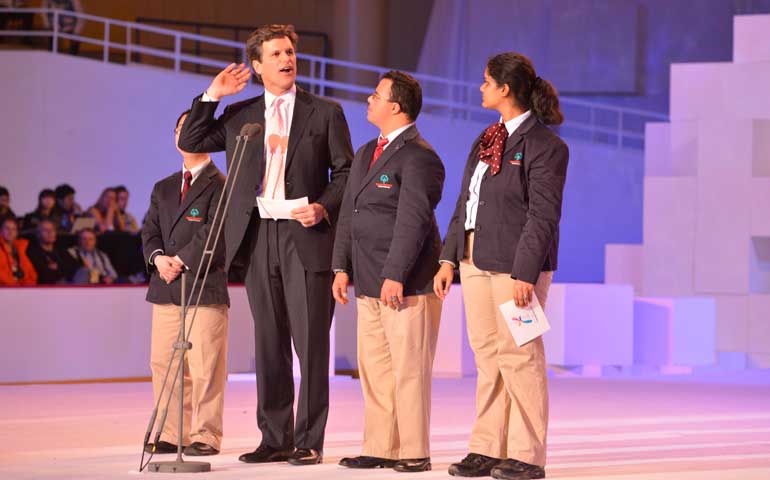
Timothy Shriver listens for the reply to his question, "Athletes, will you lead us?", during the Jan. 29, 2013, opening ceremony of the Special Olympics Winter Games in Pyeongchang, South Korea. (Will Schermerhorn)
Timothy Shriver -- who is 55 and has directed the Special Olympics for the past 10 years and has had the mettle to make it the world's largest sports program, involving 4 million people in 180 countries -- had a participatory childhood, triply so.
In the mid-1960s, he swam, raced, jumped, leaped, hurdled and tumbled on the broad and sweeping Bermuda grass lawn of his parent's oak-filled estate in Rockville, Md. Besides his three brothers and one sister, his playmates were also children with Down syndrome. They were brought there on summer days by his parents, Sargent and Eunice Kennedy Shriver, who believed that the intellectually disabled deserved inclusion, not exclusion.
When not romping on the playing fields of what was Camp Shriver -- which would in 1968 become the Special Olympics -- Tim participated in the Roman Catholicism of his family. At 7, he was an altar boy, "but I was also more than that: I was on a faith journey and already wondering, 'Who is God and how can I find God's answer to my search for what matters most?' "
The last participation was politics. It was less the obsessive competition of trying to win elections than the non-electoral politics of increasing peace and decreasing violence through programs that his parents created and that have helped uncounted millions in this country and abroad: Special Olympics, Peace Corps, Legal Services, Job Corps, Community Action, Upward Bound and Foster Grandparents.
I've known Tim Shriver since he was a lad of 7. In 1966, I came to Washington to work for his father at the Office of Economic Opportunity. After more times than I can count since then, from family gatherings -- some rousing, others monastic -- to hosting him in my classes where I taught two of his children, I thought I knew just about everything about him. Not true. For the past few days, I've been reading his inspiring and gracefully written new memoir, Fully Alive: Discovering What Matters Most. It's the story of a man who has pulled off the feat of combining activism with reflection, of not only asking life's deepest questions, but then questioning the answers.
For a time, after marrying Linda Potter, a public interest lawyer with whom he is raising five children, Tim seemed marked for a life in education. As a Yale undergraduate in the early 1980s, he mentored and tutored high-risk teenagers in low-income neighborhoods of New Haven, Conn. Those experiences enticed him to teach for 13 years in the city's most underserved schools. When his efforts to create educational programs that went beyond testing, grading and other deadening rotes were not endorsed by the local powers, Tim came home in 1996 to Washington and the Special Olympics.
Telling people of the move, a common response was "That's so nice."
"The word 'nice' came up over and over again," he writes. "This irritated me immensely. There was something patronizing and dismissive about that word, and it was inaccurate. Whatever Special Olympics is, it isn't 'nice.' Nice isn't about digging deep into the brokenness and healing of life. Nice isn't about the centering intelligence that enables human beings to welcome one another with love. Nice isn't about challenging the world to uproot deep and stubborn prejudices that destroy the lives of millions of people. My work in education had always been edgy, tough, confrontational, empowering. I saw Special Olympics the same way, but I realized others didn't."
As his parents aged and eased into retirement -- Eunice would pass away in 2009 and Sargent in 2011 -- Tim took to traveling the world as Special Olympics CEO to expand programs by meeting with athletes, parents, volunteers, sponsors, vendors and host-country politicians. It meant organizing summer and winter World Games in sites from Dublin to Shanghai, and the ongoing regional and local games.
Beneath it all lies a spiritual life, almost contemplative, fueled by the sacraments of Catholicism and Tim's fidelity to them. He has read and absorbed the mystics -- the Sufi Rumi, Teresa of Avila, the Jewish prophet Haggai -- and has been nourished by Jean Vanier and Flannery O'Connor.
Still, he has learned the most from his playmates on his parent's lawn and the tens of thousands who would come after. "I would learn along the way that the most powerful role models in my search would not be the mighty and beautiful whom I had been raised to try to outdo, but instead the vulnerable and the forgotten on the edge of life whom I had been raised to help."
[Colman McCarthy, a former Washington Post columnist, directs the Center for Teaching Peace in Washington.]


